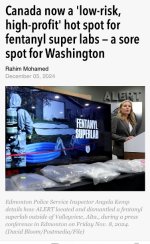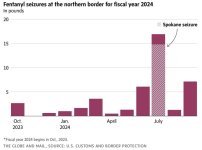Tweeks are still functional.They’re junkie enough for me.
Fentanyl
- Thread starter petros
- Start date
You are using an out of date browser. It may not display this or other websites correctly.
You should upgrade or use an alternative browser.
You should upgrade or use an alternative browser.
How many do you wanna hire? Place into positions of trust?Tweeks are still functional.
 Canada’s in-house synthetic drug production ramped up in 2019, when China placed restrictions on exports of processed fentanyl, and took off further when COVID lockdowns interrupted the cross-border flow of goods in the early 2020s.
Canada’s in-house synthetic drug production ramped up in 2019, when China placed restrictions on exports of processed fentanyl, and took off further when COVID lockdowns interrupted the cross-border flow of goods in the early 2020s.Large-scale fentanyl labs first sprung up in British Columbia, owing to its proximity to the Asia-Pacific region, but have since spread eastward to Alberta and Ontario. Ontario police busted one such lab, located just 50 kilometres away from the Niagara Falls border crossing, in the summer of 2023.
A facility in Falkland, B.C., thought to be Canada’s biggest and most sophisticated fentanyl super lab, was shut down by police in late October 2024.
China is still believed to be the primary source of the chemical precursors processed at these facilities.
Canadian-sourced fentanyl has been recently turning up in raids in the U.S., Australia and other foreign countries.
A briefing note prepared by Global Affairs Canada in June 2024 said that there is reason to believe “Canada is now a source (and transit) country for fentanyl to some markets.”
Mexico’s president has also accused Canada of allowing fentanyl to spread easily, alluding to experimentation with drug decriminalization policies in B.C. that were facilitated by the federal government.
Hard drugs to be decriminalized in British Columbia
Hard drugs to be decriminalized in British Columbia https://www.macleans.ca/politics/hard-drugs-to-be-decriminalized-in-british-columbia/
Canada now a 'low-risk, high-profit' hot spot for fentanyl super labs — a sore spot for Washington — National Post
Law enforcement experts say provincial police need more federal resources to shut down Western Canada's booming fentanyl super labs
This is exactly what a person should expect from a Mexican in a situation like this-The Most Outrageous Lies Imaginable.Mexico’s president has also accused Canada of allowing fentanyl to spread easily, alluding to experimentation with drug decriminalization policies in B.C. that were facilitated by the federal government.
Hard drugs to be decriminalized in British Columbia
Hard drugs to be decriminalized in British Columbia https://www.macleans.ca/politics/hard-drugs-to-be-decriminalized-in-british-columbia/forums.canadiancontent.net

Canada now a 'low-risk, high-profit' hot spot for fentanyl super labs — a sore spot for Washington — National Post
Law enforcement experts say provincial police need more federal resources to shut down Western Canada's booming fentanyl super labsapple.news
The funniest part is the Mexicans magically coming up with 'The Largest Seizure Ever' a week into the argument.*

Mexico announces record drug seizure one week after Trump threatens tariffs
Soldiers and marines discover drugs in Sinaloa, while separately authorities arrest more than 5,200 migrants
FWIW-Claudia Sheibaum is in this up to her turkey neck it's the Sinaloa cartel who's bankrolling her diamond plated pension as per SOP for every Mexican president.
* by now that warehouse full of dope has been returned to it's owners as per SOP all over Latin America-large drug shipments belong to powerful dangerous people who might accept a bit of a 'writedown' but who expect to be compensated/refunded/otherwise recompensed otherwise even more bodies start appearing on the streets.
Swords…for Christs sake? Further east out on the prairies it’s machetes because of all the jungle we need to clear…& you can get your own at Bianca amor‘s for about $25. The perfect tool for robbing cabs and off sales and people at ATMs.

What legitimate purpose is ownership of a $25 machete out on the Canadian Prairie?

Oh look! They’re on sale for less than 20 bucks this week!!

What legitimate purpose is ownership of a $25 machete out on the Canadian Prairie?

Oh look! They’re on sale for less than 20 bucks this week!!
Swords…for Christs sake? Further east out on the prairies it’s machetes because of all the jungle we need to clear…& you can get your own at Bianca amor‘s for about $25. The perfect tool for robbing cabs and off sales and people at ATMs.
View attachment 27364
What legitimate purpose is ownership of a $25 machete out on the Canadian Prairie?
View attachment 27365
Oh look! They’re on sale for less than 20 bucks this week!!
Killings of 2 men, 2 women on Carry the Kettle Nakoda Nation may have been targeted: Sask. RCMP
Fuck....I know one of the female victims. Still waiting for confirmation. I hope not. Saskatchewan RCMP say the deaths of two men and two women on Carry the Kettle Nakoda Nation on Tuesday are being considered homicides and may have been targeted. On Tuesday, RCMP said officers responded to a...
When I said brutal....
Ugh…wow…dude used a taxi robbery special? That’s so Papa Doc brutal.Killings of 2 men, 2 women on Carry the Kettle Nakoda Nation may have been targeted: Sask. RCMP
Fuck....I know one of the female victims. Still waiting for confirmation. I hope not. Saskatchewan RCMP say the deaths of two men and two women on Carry the Kettle Nakoda Nation on Tuesday are being considered homicides and may have been targeted. On Tuesday, RCMP said officers responded to a...forums.canadiancontent.net
When I said brutal....
RCMP said that families had been notified and the deaths were “suspicious in nature.” A machete on the prairie in & of itself is pretty suspicious in nature.

RCMP confirm 2 men and 2 women were killed on Carry the Kettle
RCMP: unable to confirm arrest is linked to the four murders but believe there is no danger to the public.
 www.cjme.com
www.cjme.com
Don't know the why just the Dexter style how.Ugh…wow…dude used a taxi robbery special? That’s so Papa Doc brutal.
RCMP said that families had been notified and the deaths were “suspicious in nature.” A machete on the prairie in & of itself is pretty suspicious in nature.
Something like that seems pretty “targeted” as opposed to random. Domestic dispute?
RCMP confirm 2 men and 2 women were killed on Carry the Kettle
RCMP: unable to confirm arrest is linked to the four murders but believe there is no danger to the public.www.cjme.com
The data the White House has cited to say Canada is responsible for a “massive” increase in fentanyl flowing across the northern border include a large drug bust that, according to the U.S. border agency, has no known connection to Canada.
In justifying its plans for tariffs on Canadian goods, the White House said in a statement Monday that 43 pounds of fentanyl had been seized at the northern border last fiscal year, representing a “massive 2050 per cent increase” compared with the fiscal year prior, when two pounds of fentanyl was intercepted.
However, court records and interviews indicate that about one-third of the 43-pound tally was seized in July in Spokane, Wash. – more than 150 kilometres from the border with Canada – as part of an investigation last summer that led to charges against three Mexican nationals.

Although the seizure of 14.8 pounds of fentanyl is listed in U.S. Customs and Border Protection data as associated with the “northern border,” and therefore included in last year’s 43-pound total, a spokesperson for the agency said the seizure has no known nexus to Canada.
It was included in the total because of its proximity to the border and the involvement of northern border patrol staff in the investigation, which was conducted by a task force from multiple U.S. law-enforcement agencies. Oh well.

 apple.news
The months-long probe, which was led by the U.S. Drug Enforcement Administration, is outlined in documents filed in U.S. District Court in Spokane. This includes an affidavit sworn by a Customs and Border Protection northern border patrol official who had been working with the DEA.
apple.news
The months-long probe, which was led by the U.S. Drug Enforcement Administration, is outlined in documents filed in U.S. District Court in Spokane. This includes an affidavit sworn by a Customs and Border Protection northern border patrol official who had been working with the DEA.
The operation involved a search of two vehicles and a house, and resulted in the seizure of approximately 68,000 pills presumed to be fentanyl, as well as several firearms, large bundles of U.S. currency and several other drugs such as methamphetamine, cocaine and heroin.
Investigators amassed evidence that a car used by the alleged drug traffickers, which had California licence plates, travelled from Phoenix to Spokane in the weeks prior to the seizure, court records show. There is no mention of Canada in the criminal indictment against the three men, or the affidavit sworn by the border agent.
The White House did not respond to The Globe’s request for comment as of deadline Tuesday evening.
In justifying its plans for tariffs on Canadian goods, the White House said in a statement Monday that 43 pounds of fentanyl had been seized at the northern border last fiscal year, representing a “massive 2050 per cent increase” compared with the fiscal year prior, when two pounds of fentanyl was intercepted.
However, court records and interviews indicate that about one-third of the 43-pound tally was seized in July in Spokane, Wash. – more than 150 kilometres from the border with Canada – as part of an investigation last summer that led to charges against three Mexican nationals.

Although the seizure of 14.8 pounds of fentanyl is listed in U.S. Customs and Border Protection data as associated with the “northern border,” and therefore included in last year’s 43-pound total, a spokesperson for the agency said the seizure has no known nexus to Canada.
It was included in the total because of its proximity to the border and the involvement of northern border patrol staff in the investigation, which was conducted by a task force from multiple U.S. law-enforcement agencies. Oh well.
Nearly one-third of seized fentanyl attributed to the U.S.-Canada border had no connection with Canada — The Globe and Mail
Finding undermines assertions by Trump administration that Canada is a rapidly growing source of fentanyl in the U.S.
The operation involved a search of two vehicles and a house, and resulted in the seizure of approximately 68,000 pills presumed to be fentanyl, as well as several firearms, large bundles of U.S. currency and several other drugs such as methamphetamine, cocaine and heroin.
Investigators amassed evidence that a car used by the alleged drug traffickers, which had California licence plates, travelled from Phoenix to Spokane in the weeks prior to the seizure, court records show. There is no mention of Canada in the criminal indictment against the three men, or the affidavit sworn by the border agent.
The White House did not respond to The Globe’s request for comment as of deadline Tuesday evening.
The data the White House has cited to say Canada is responsible for a “massive” increase in fentanyl flowing across the northern border include a large drug bust that, according to the U.S. border agency, has no known connection to Canada.
In justifying its plans for tariffs on Canadian goods, the White House said in a statement Monday that 43 pounds of fentanyl had been seized at the northern border last fiscal year, representing a “massive 2050 per cent increase” compared with the fiscal year prior, when two pounds of fentanyl was intercepted.
However, court records and interviews indicate that about one-third of the 43-pound tally was seized in July in Spokane, Wash. – more than 150 kilometres from the border with Canada – as part of an investigation last summer that led to charges against three Mexican nationals.
View attachment 27439
Although the seizure of 14.8 pounds of fentanyl is listed in U.S. Customs and Border Protection data as associated with the “northern border,” and therefore included in last year’s 43-pound total, a spokesperson for the agency said the seizure has no known nexus to Canada.
It was included in the total because of its proximity to the border and the involvement of northern border patrol staff in the investigation, which was conducted by a task force from multiple U.S. law-enforcement agencies. Oh well.
The months-long probe, which was led by the U.S. Drug Enforcement Administration, is outlined in documents filed in U.S. District Court in Spokane. This includes an affidavit sworn by a Customs and Border Protection northern border patrol official who had been working with the DEA.
Nearly one-third of seized fentanyl attributed to the U.S.-Canada border had no connection with Canada — The Globe and Mail
Finding undermines assertions by Trump administration that Canada is a rapidly growing source of fentanyl in the U.S.apple.news
The operation involved a search of two vehicles and a house, and resulted in the seizure of approximately 68,000 pills presumed to be fentanyl, as well as several firearms, large bundles of U.S. currency and several other drugs such as methamphetamine, cocaine and heroin.
Investigators amassed evidence that a car used by the alleged drug traffickers, which had California licence plates, travelled from Phoenix to Spokane in the weeks prior to the seizure, court records show. There is no mention of Canada in the criminal indictment against the three men, or the affidavit sworn by the border agent.
The White House did not respond to The Globe’s request for comment as of deadline Tuesday evening.


BC RCMP - Federal Investigators take down the largest, most sophisticated drug superlab in Canada
Federal Investigators take down the largest, most sophisticated drug superlab in Canada
Describing the drug superlab as the largest, and most sophisticated of its kind with the capability of producing multiple types of illicit drugs, Federal investigators seized 54 kg of fentanyl, massive amounts of precursor chemicals, 390 kg of methamphetamine, 35 kg of cocaine, 15 kg of MDMA, and 6 kg of cannabis.
In addition to the massive quantities of drugs and precursor chemicals, investigators seized a total of 89 firearms, which included 45 handguns, 21 Ar-15-style rifles, and submachine guns; many of which were loaded and ready for use. To date, nine of these guns have been identified as stolen.
The searches also yielded small explosive devices, large amounts of ammunition, firearm silencers, high-capacity magazines, body armour, and $500,000 in cash.

'Highly sophisticated' fentanyl 'superlab' shut down in Alberta
Alberta authorities say they caught a fentanyl "cook" red-handed in the kitchen at a rural property last month.
Alberta authorities say they caught a fentanyl "cook" red-handed in the kitchen at a rural property last month.
Download the CTV News App for breaking news alerts on all the top Edmonton stories
Investigators at Alberta Law Enforcement Response Teams (ALERT) believe the "superlab" outside Valleyview, 300 kilometres northwest of Edmonton, was responsible for producing bulk quantities of fentanyl for at least two years, possibly multiple kilograms every seven-to-eight-day cook cycle.
ADVERTISEMENT
ALERT says it took its own officers and Mounties four days to search and tear down the "highly sophisticated" lab on Oct. 2.
They found seven kilograms of processed fentanyl, worth an estimated street value of $700,000.
They also found 4,200 litres of what is believed to be fentanyl precursor chemicals and 1,500 litres of chemical waste from production, in addition to tens of thousands of dollars in equipment like rotary evaporators, large reaction vessels, and industrial mixers.
ALERT won't say how it came to investigate the farm.
"The majority of the neighbours were surprised when they found out," said Edmonton Police Service Insp. Angela Kemp, who leads ALERT's organized crime team, during a press conference on Friday.
"It goes to show how labs like this are very clandestine. … So if anyone has any awareness questions about suspicious activity, please let us know or your local police."
As ALERT believes the lab was a significant source of fentanyl in Alberta and western Canada, Kemp said the seizure will "impact" fentanyl distribution and sale.
1 arrested
Stephen Mogg, 55, from Kelowna, B.C., was arrested during the October search warrant and is accused of production of a controlled substance and possession of fentanyl for the purpose of trafficking.
He does not have "much" of a criminal record but is "very much entrenched in the criminal lifestyle," as Kemp put it.
ALERT is still investigating the lab's connection to a "larger interprovincial organized crime group" operating throughout western Canada that it believes not only deals in drug production, but also chemical importation and wholesale distribution.
When asked on Friday whether the lab was connected to one recently shut down in B.C., believed to be the "largest and most sophisticated ever in Canada," ALERT said it has reached out to that province's police but so far has not confirmed any link.
ALERT considers two micrograms of fentanyl a lethal dose.
The seized fentanyl "paints a very scary picture of what was taking place in Valleyview and what was being pumped into our communities," Kemp told reporters.
"We can only hypothesize over how many lives were lost, how many families were ruined, and how many overdoses could be linked back to the superlab."
Yep…&…

BC RCMP - Federal Investigators take down the largest, most sophisticated drug superlab in Canada
Federal Investigators take down the largest, most sophisticated drug superlab in Canadabc-cb.rcmp-grc.gc.ca

'Highly sophisticated' fentanyl 'superlab' shut down in Alberta
Alberta authorities say they caught a fentanyl "cook" red-handed in the kitchen at a rural property last month.www.ctvnews.ca
…so…guilty by geography alone?Investigators amassed evidence that a car used by the alleged drug traffickers, which had California licence plates, travelled from Phoenix to Spokane in the weeks prior to the seizure, court records show. There is no mention of Canada in the criminal indictment against the three men, or the affidavit sworn by the border agent.
That was an old pot transport route. Mostly going south from farms in the interior. Since various provincial governments have been destroying the logging and mining in the area, this is about the only industry left. All those Esplanades running around up there are not being paid for by tourism.Yep…&…
…so…guilty by geography alone?
Kinda like Easterners?Yep…&…
…so…guilty by geography alone?
Guilty by claiming there isnt a problemYep…&…
…so…guilty by geography alone?
Former Mountie Kevin Brosseau named fentanyl czar in reply to Trump’s tariff threats
Author of the article:Canadian Press
Canadian Press
Jim Bronskill
Published Feb 11, 2025 • Last updated 1 day ago • 1 minute read
OTTAWA — The Liberal government has named Kevin Brosseau, a former senior Mountie, to be the federal point person on fighting the spread of deadly fentanyl.
Prime Minister Justin Trudeau says Brosseau’s role as fentanyl czar will involve working closely with U.S. counterparts to accelerate Canada’s efforts to detect, disrupt and dismantle the illicit trade in the drug.
A statement Tuesday from the Prime Minister’s Office said Brosseau’s demonstrated expertise tackling drug trafficking, organized crime networks and other national security threats “will bring tremendous value to this position.”
During his more than 20 years in the RCMP, Brosseau served as a deputy commissioner and the senior Mountie in Manitoba.
More recently, he was a senior official in the transport and fisheries departments before becoming deputy national security and intelligence adviser to the prime minister.
U.S. President Donald Trump recently threatened to impose steep tariffs on all goods from Canada, citing the southbound flow of migrants and illegal drugs including fentanyl, a potent synthetic opioid.
After Trudeau explained details of Canada’s plans to beef up the border, Trump agreed to a month-long pause on the tariffs while the two work on a new economic arrangement.
The statement Tuesday said while less than one per cent of the fentanyl intercepted at the U.S. border comes from Canada, “any amount of fentanyl is too much.”
“Fentanyl is a lethal drug that has torn apart communities and families across Canada and the United States,” the statement said. “The scourge of fentanyl must be wiped from the face of the Earth, its production must be shut down, and its profiteers must be punished.”
Ottawa outlined a $1.3-billion plan in December to bolster security and surveillance at the Canada-U.S. border.
It recently announced additional plans to appoint the fentanyl czar and to list organized crime cartels as terrorist organizations.

 torontosun.com
torontosun.com
Author of the article:Canadian Press
Canadian Press
Jim Bronskill
Published Feb 11, 2025 • Last updated 1 day ago • 1 minute read
OTTAWA — The Liberal government has named Kevin Brosseau, a former senior Mountie, to be the federal point person on fighting the spread of deadly fentanyl.
Prime Minister Justin Trudeau says Brosseau’s role as fentanyl czar will involve working closely with U.S. counterparts to accelerate Canada’s efforts to detect, disrupt and dismantle the illicit trade in the drug.
A statement Tuesday from the Prime Minister’s Office said Brosseau’s demonstrated expertise tackling drug trafficking, organized crime networks and other national security threats “will bring tremendous value to this position.”
During his more than 20 years in the RCMP, Brosseau served as a deputy commissioner and the senior Mountie in Manitoba.
More recently, he was a senior official in the transport and fisheries departments before becoming deputy national security and intelligence adviser to the prime minister.
U.S. President Donald Trump recently threatened to impose steep tariffs on all goods from Canada, citing the southbound flow of migrants and illegal drugs including fentanyl, a potent synthetic opioid.
After Trudeau explained details of Canada’s plans to beef up the border, Trump agreed to a month-long pause on the tariffs while the two work on a new economic arrangement.
The statement Tuesday said while less than one per cent of the fentanyl intercepted at the U.S. border comes from Canada, “any amount of fentanyl is too much.”
“Fentanyl is a lethal drug that has torn apart communities and families across Canada and the United States,” the statement said. “The scourge of fentanyl must be wiped from the face of the Earth, its production must be shut down, and its profiteers must be punished.”
Ottawa outlined a $1.3-billion plan in December to bolster security and surveillance at the Canada-U.S. border.
It recently announced additional plans to appoint the fentanyl czar and to list organized crime cartels as terrorist organizations.

Former Mountie Kevin Brosseau named fentanyl czar in reply to Trump’s tariff threats
During his more than 20 years in the RCMP, Brosseau served as a deputy commissioner and the senior Mountie in Manitoba.


